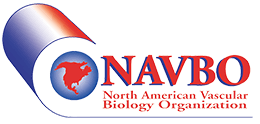Webinar with IVBM Speakers Miranda Marvel and Amber Stratman

Webinar with IVBM Speakers Miranda Marvel and Amber Stratman
Thursday, April 6, 2023 (1:00 PM - 2:00 PM) (EDT)
Description
Join us as Dr. Miranda Marvel, a post doctoral researcher from the NIH, and Dr. Amber Stratman, Assistant Professor at Washington University in St. Louis School of Medicine, present their lectures featured at the 22nd International Vascular Biology Meeting. Dr. Marvel will present "A novel epigenetic regulator of arterial specification and development in zebrafish." Dr. Stratman will present "Hemodynamic regulation of blood vessel stabilization". Both abstracts are included below.
Dr. Marvel Abstract: Epigenetic mechanisms such as DNA and histone methylation play crucial roles in gene regulation and cell differentiation during development, but most vertebrate tissue-specific epigenetic regulators are still unknown. Our lab recently developed a novel “EpiTag” transgenic epigenetic reporter zebrafish line that reliably reports tissue-specific epigenetic silencing and activation via the expression of a destabilized green fluorescent protein (GFPd2). Using this line, we performed the first ever large-scale vertebrate forward genetic screen for epigenetic-related mutants and identified a mutant in an uncharacterized histone demethylase, Kdm4ab, with defects in vascular sprouting and arterial vessel development. Transcriptomic analysis of mutants identified many dysregulated angiogenic and arterial-specific genes, with many arterial-related genes exhibiting downregulation and venous-related genes showing an unexpected upregulation in mutant tissues. Further in situ experiments revealed the upregulated venous genes are ectopically expressed in arterial vessels in kdm4ab mutants. Analysis of histone methylation in kdm4ab mutants via CUT&RUN revealed that many vascular-related genes also have aberrantly increased H3K9me3 marks, suggesting they may be targets of Kdm4ab demethylase activity during development. Our ongoing experiments are currently elucidating the endothelial cell-autonomous roles of Kdm4ab in regulating arterial differentiation and development. Our preliminary findings suggest that Kdm4ab is a novel critical epigenetic regulator of arterial specification and development, and we are further characterizing the mechanisms of action of this histone demethylase.
Dr. Stratman Abstract: Endothelial cell (EC)-mural cell (MC) interactions are known to remodel in response to hemodynamic forces, yet there is a lack of mechanistic understanding of the signaling pathways that underlie these events. Here, using zebrafish and translational ribosomal affinity purification (TRAP) profiling, we took an unbiased approach to identify novel pathways regulated by hemodynamic onset. From this work, we have identified novel signaling networks regulated by blood flow in ECs that alter MC function, including the chemokine receptor, CXCR3, and one of its ligands, CXCL11. We show that inhibition of CXCR3 or CXCL11 in ECs leads to a dilation and expansion of EC tube networks, both in vitro and in vivo. These studies are done using in vitro modeling assays lacking lymphocytes or in the zebrafish embryo prior to specification of lymphocytes, supporting an EC autonomous need for this signaling network. In vitro modeling of EC-MC interactions demonstrates that suppression of EC specific CXCR3 signaling, either through siRNA treatment or pharmacological inhibition via the inhibitor AMG487, leads to loss of MC association with EC tubes and decreased extracellular deposition of vascular basement membrane components including laminin and collagen IV. In vivo, phenotypic defects are particularly noted around the cardiac outflow tract (OFT). Cxcl11 genetic zebrafish mutants, zebrafish treated with Cxcl11 or Cxcr3 neutralizing antibodies, or zebrafish treated with the Cxcr3 inhibitor AMG487 all show dilation of their hearts and loss of MC remodeling of the OFT.
Images

NAVBO Online
Webinar Series
